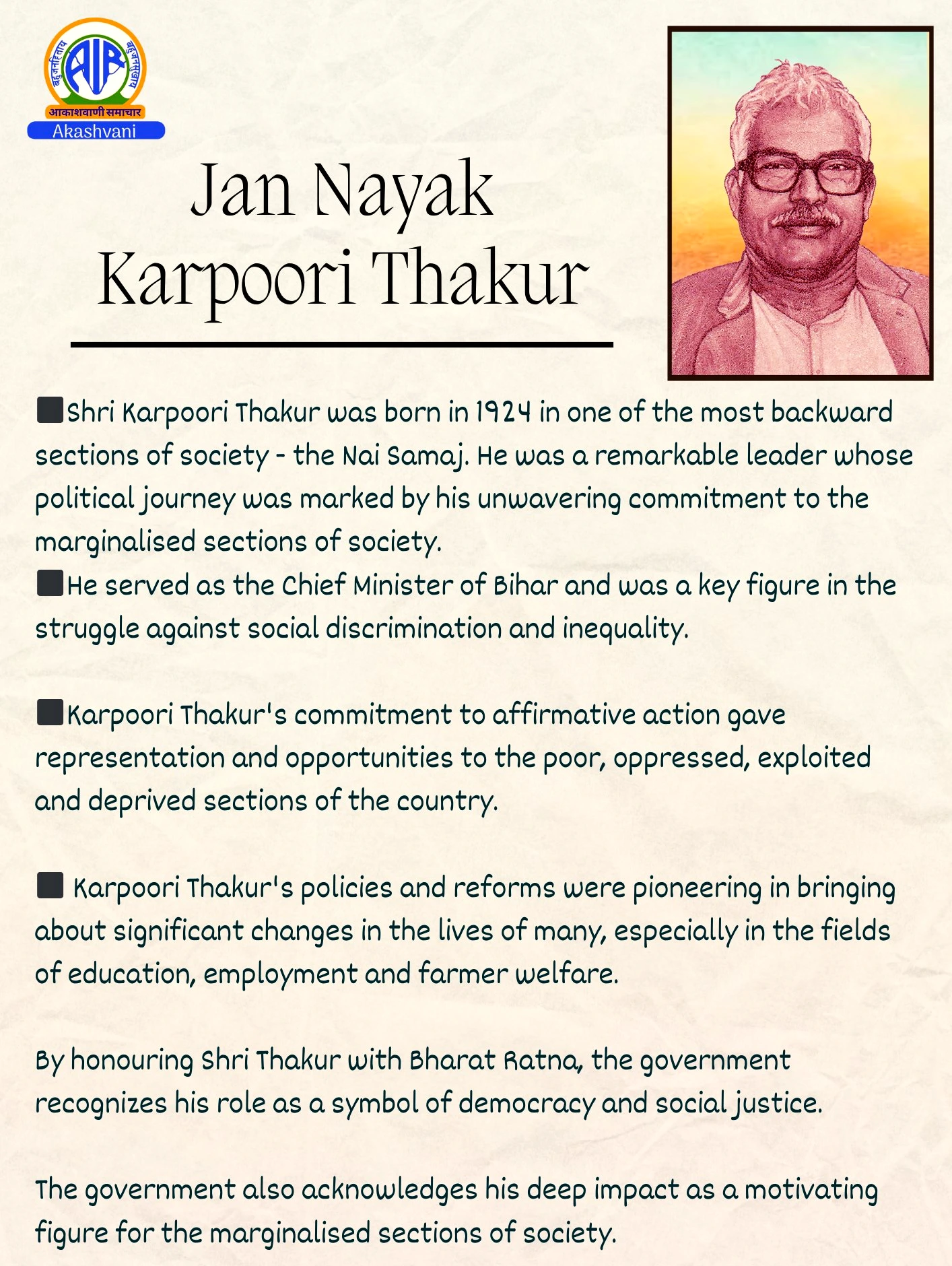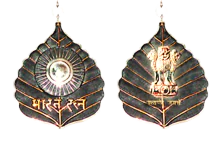Context:
Former Bihar Chief Minister Karpoori Thakur will posthumously be honored with Bharat Ratna.
It was announced on his 100th birth anniversary.
About Karpoori Thakur

- Karpoori Thakur was born in 1924 in one of the most backward sections of society – the Nai (Barber) community, known for his unwavering commitment to the marginalized sections of society.
- Karpoori Thakur was also known as ‘Jan Nayak’ (People’s Leader) and participated in the Quit India movement, enduring several months in jail.
- He was the Bihar Chief minister twice (December 1970 to June 1971 and December 1977 to April 1979.
- He joined All India Students’ Federation (AISF) after completing his studies.
Karpoori Thakur Contribution
- Implementing the Mungerilal Commission report: This report recommended job reservations for the backward classes in Bihar.
- Empowered millions of farmers, boosting agricultural productivity and rural development by implementing land reforms through The Bihar Tenancy Act.
- The National midday meal scheme was his brainchild and continues to improve educational outcomes across India
- Reform Initiatives: He removed English as compulsory subject for the matriculation examinations; prohibition of alcohol; preferential treatment for unemployed engineers in government contracts.
- Sampoorna Kranti: Karpoori Thakur along with JP Narayan, was instrumental in launching the iconic ‘Sampoorna Kranti’ (Total Revolution) movement with the aim of transforming Indian society in a non-violent way.
MungeriLal Commission Report (1977-78)
- In 1971, the Bihar government formed the Mungerilal Commission to find out about different castes’ social and political status.
- It submitted its report to the Bihar government in 1975. The report was later presented in the Bihar Legislative Assembly by Chief Minister Karpoori Thakur in 1978.
- Following this, in 1979, the central government formed the Mandal Commission.
|
Highest Civilian Award: Bharat Ratna
It is the highest civilian award of the Republic of India, instituted on 2 January 1954.

- The award is conferred in recognition of exceptional service performance of the highest order without distinction of race, occupation, or sex.
- It is awarded in recognition of exceptional service/performance of the highest order in any field of human endeavor.
- Award Specifications: The original specifications for the award called for a circular gold medal, 35 mm in diameter, with the sun and the Hindi legend “Bharat Ratna” above and a floral wreath below. The reverse was to carry the state emblem and motto.
Other Criteria
- The recommendations for Bharat Ratna are made by the Prime Minister to the President.
- The number of annual awards is restricted to three in a particular year.
- On award confirmation, the recipient receives a Sanad (certificate) signed by the President and a medallion.
- The Award does not carry any monetary grant.
- In terms of Article 18 (1) of the Constitution, the award cannot be used as a prefix or suffix to the recipient’s name.
- However, should an award winner consider it necessary, he/she may use the following expression in their biodata/letterhead/visiting card etc. to indicate that he/she is a recipient of the award: ‘Awarded Bharat Ratna by the President’ or ‘Recipient of Bharat Ratna Award’
Important Facts about Bharat Ratna Recipient
- The holders of Bharat Ratna rank 7th in the Indian order of precedence.
- Till now it has been given to 49 persons and 15 are awarded posthumously.
- First Bharat Ratna Awardee: Shri Rajagopala Chari, Sarvapalli Radha Krishna, CV Raman
- Youngest Bharat Ratna Recipient Sachin Tendulkar and only sportsman.
- First singer Recipient of Bharat Ratna M.S. Subbulakshmi.
- First foreigner Recipient Abdul Gaffar Khan & Nelson Mandela.
- First naturalized Indian citizen Agnes Gonxha Bojaxhiu, better known as Mother Teresa.
- In 2019, it was awarded to Nanaji Deshmukh and Bhupen hajarika and Pranab Mukherjee.
- Out of 49 Bharat Ratna awardees, five females, six presidents and seven prime ministers are awarded by Bharat Ratna.
- Bharat Ratna was suspended Only from July 1977 to January 1980 due to a change in government and again suspended between August 1992 to December 1995.
News Source: The Hindu
![]() 24 Jan 2024
24 Jan 2024

